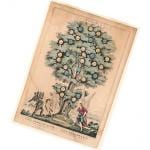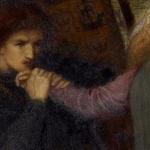 Love is better than fear, revenge is not justice, and sometimes you should get away from vile people, before vile people get rid of you. So I learned from John’s Gospel and Hamlet, two works read in one weekend.
Love is better than fear, revenge is not justice, and sometimes you should get away from vile people, before vile people get rid of you. So I learned from John’s Gospel and Hamlet, two works read in one weekend.
Hamlet is funny in a Halloween-can-be-jolly sort of way, profound, sad, and wise. John wrote a Gospel that keeps showing that perfect love casts out all fear, even on the cross or in the tomb. Shakespeare’s Hamlet had the Gospel of mercy, grace, and love, but chose to live by the code of revenge. If Hamlet had acted on the Gospel instead of the advice of a damned ghost, he might have married Ophelia, moved to England, and had children. Instead, he worried and wrangled himself into misery, murder, and madness.
Fear and loathing isn’t good for the soul.
Hamlet, the play not the character, is full of the Gospel, so we see the mistakes that are mounting up. In Hamlet, God definitely is in His Heaven and if something is rotten in the state of Denmark, divine justice will see the rot is removed. That’s good for the average Dane, who sees his unfit ruling class removed without his having to go war, but bad for the Danish princes. Hamlet fears to act, fears not acting, fears death and fears living.
”To be or not to be?”
Speeches that toy with suicide only to back off out of fear of maybe-hell sum up the dead end of fear. Hamlet acts like all of us when we are fearful: in irrational bursts motivated by his fear. He fears a rat creeping into his mother’s bedroom and kills his lover’s father in his fear.
Hatred is fear made into history: acting out of and on our fears. We fear that something good is being kept from us by God, ‘them,” or “fate.” So we strike out to get what we deserve, while fearing we shan’t get it. Perfect fear casts out all love. Like Hamlet, if we act on fear, we will harm those we love in our desire to “win.” This makes interesting theater, but is horrible in a lover.
Ophelia and Hamlet are afraid and so end up dead. Hamlet is not just about Hamlet’s dithering and indecision. Instead, Hamlet shows that the fearful inherit damnation. The meek inherit the Earth.
The Christian ethic one hears in John’s Gospel is about service, forgiveness, mercy. All those things would have had Hamlet sit and talk to Ophelia, treating her as human. They would have discovered that there was much rottenness in Denmark, but not in love between a man and a woman.
Hamlet should have eloped with Ophelia to England and bought Rosencrantz and Guildenstern a beer to celebrate the occasion. Instead, Hamlet was clever and so everyone ended up dead. Fear makes for death, love is fecund.
This is very practical: today I can reject the politics of power, a politics based on fear in my life, work, and relationships. Instead, I can practice an ethic of love: do to others as I would have them do to me. We can fall in love with our neighbor, the weirdling across the street, even our enemy if Jesus is to be believed. This love is not afraid of justice, it comes powerful and armed for battle, because love is never afraid.
Perfect love casts out all fear.
.












